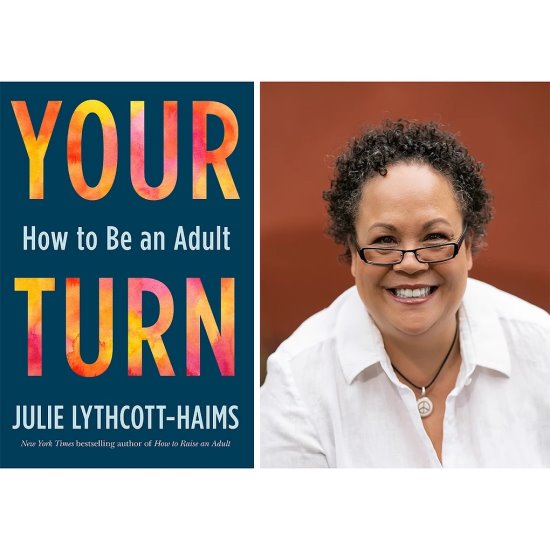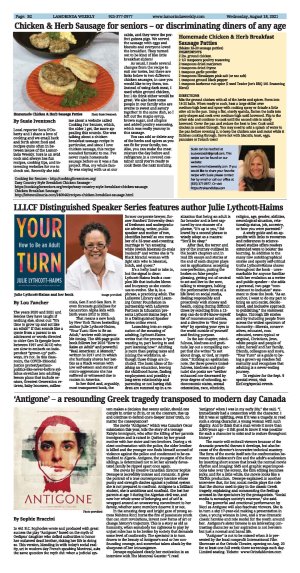| | Published August 18th, 2021
| LLLCF Distinguished Speaker Series features author Julie Lythcott-Haims
| | | By Lou Fancher |  | | Julie Lythcott-Haims and her book Image provided |
The years 2020 and 2021 and lessons they have taught if nothing else, shout out: "It's time to grow up and act like an adult!" If that sounds like a quote from a parent to an adolescent or words directed to older Gen Zs (people born between 1997 and 2012) who are slow to embark on independent "grown-up" pathways, it's not. In this classroom, the COVID-19/social justice protest/partisan-politics-like-never-before syllabus stretches into adulting lesson plans that include seniors, Greatest Generation retirees, baby boomers, millennials, Gen Z and Gen Xers. It even forecasts guidelines for Generation Alpha kids with birth years 2012 to 2025.
 That means a new book by New York Times bestselling author Julie Lythcott-Haims, "Your Turn: How to Be an Adult," arrives with impeccable timing. The 486-page guide book follows her 2016?"How to Raise an Adult"?and powerful "Real American: A Memoir," written in 2017 and in which she fearlessly shares her battles as a Black woman with low self-esteem and stories of micro-aggressions she has suffered or witnessed due to racism in America.
That means a new book by New York Times bestselling author Julie Lythcott-Haims, "Your Turn: How to Be an Adult," arrives with impeccable timing. The 486-page guide book follows her 2016?"How to Raise an Adult"?and powerful "Real American: A Memoir," written in 2017 and in which she fearlessly shares her battles as a Black woman with low self-esteem and stories of micro-aggressions she has suffered or witnessed due to racism in America.
 In her third and, arguably, most transparent book, the former corporate lawyer, former Stanford University dean of freshmen and undergraduate advising, writer, public speaker and mother of two, identifies herself as one member of a 32-year-and-counting marriage to "an amazing white Jewish bisexual cis-male husband" and writes she is "a Black biracial woman with light skin who is bisexual, butch, and queer."
In her third and, arguably, most transparent book, the former corporate lawyer, former Stanford University dean of freshmen and undergraduate advising, writer, public speaker and mother of two, identifies herself as one member of a 32-year-and-counting marriage to "an amazing white Jewish bisexual cis-male husband" and writes she is "a Black biracial woman with light skin who is bisexual, butch, and queer."
 It's a hefty load to take in, but the signal is clear: Lythcott-Haims leads a complex life that includes blows and buoyancy as she continues to evolve. She is, in a phrase, a practicing adult. The Lafayette Library and Learning Center Foundation in partnership with Lafayette Partners in Education presents Lythcott-Haims Sept. 9 in a Distinguished Speaker Series online event.
It's a hefty load to take in, but the signal is clear: Lythcott-Haims leads a complex life that includes blows and buoyancy as she continues to evolve. She is, in a phrase, a practicing adult. The Lafayette Library and Learning Center Foundation in partnership with Lafayette Partners in Education presents Lythcott-Haims Sept. 9 in a Distinguished Speaker Series online event.
 Launching into an explanation of the meaning of adulting, Lythcott-Haims writes that the process is "part wanting to, part having to and part learning how." Adulting is more than paying taxes and joining the workforce, although those things are included. The basic ideas of finishing an education, leaving the childhood home, finding employment and possibly a long-term relationship and parenting or not having children are summed up in a realization that being an adult is far broader and is best captured by one stunner of a phrase, "It's up to you," followed by a second phrase to wisely adopt as a mantra: "You'll be okay."
Launching into an explanation of the meaning of adulting, Lythcott-Haims writes that the process is "part wanting to, part having to and part learning how." Adulting is more than paying taxes and joining the workforce, although those things are included. The basic ideas of finishing an education, leaving the childhood home, finding employment and possibly a long-term relationship and parenting or not having children are summed up in a realization that being an adult is far broader and is best captured by one stunner of a phrase, "It's up to you," followed by a second phrase to wisely adopt as a mantra: "You'll be okay."
 After that, the terror and joy of the journey outlined in the book's chapters and in real life essays and stories at the end of each chapter plays out in applications: accepting non-perfection, putting the brakes on false people-pleasing, getting out of neutral to act and live in the now, talking to strangers, halting the performative forces of a life lived on social media, dealing responsibly and proactively with money and health, coping during difficult times by selecting from a 12-step can-do-it-if-I-know-myself list of recommenced actions, and a directive to "find your why" by opening your eyes to the world outside of yourself and finding purpose.
After that, the terror and joy of the journey outlined in the book's chapters and in real life essays and stories at the end of each chapter plays out in applications: accepting non-perfection, putting the brakes on false people-pleasing, getting out of neutral to act and live in the now, talking to strangers, halting the performative forces of a life lived on social media, dealing responsibly and proactively with money and health, coping during difficult times by selecting from a 12-step can-do-it-if-I-know-myself list of recommenced actions, and a directive to "find your why" by opening your eyes to the world outside of yourself and finding purpose.
 In the last chapter, mindfulness, kindness and gratitude lay out a compelling carpet that she writes "is not about drugs, or God, or mysticism." Striking an egalitarian note, the three powers (mindfulness, kindness and gratitude) she posits are "neither enhanced nor decreased by your degree of schooling, socioeconomic status, sexual orientation, race, ethnicity, religion, age, gender, abilities, neurological situation, relationship status, job, ancestry, or how you were parented."
In the last chapter, mindfulness, kindness and gratitude lay out a compelling carpet that she writes "is not about drugs, or God, or mysticism." Striking an egalitarian note, the three powers (mindfulness, kindness and gratitude) she posits are "neither enhanced nor decreased by your degree of schooling, socioeconomic status, sexual orientation, race, ethnicity, religion, age, gender, abilities, neurological situation, relationship status, job, ancestry, or how you were parented."
 A study guide and an appendix with links to resources and references to science-based studies offers readers extended ways to bolster the learning. In addition to the many raw autobiographical stories and openly self-critical truths Lythcott-Haims shares throughout the book - unremarkable for anyone familiar with her evolution as a writer and public speaker - she adds a personal, two-page "commitment to inclusion" statement to close the book. "As an author, I want to do my part to bring an anti-racist, decolonized, and inclusive approach to publishing," the statement begins. Through life stories and by including people from across the widest spectrum of humanity-liberals, conservatives, educated, non-educated, neuro-typical or atypical, Christians, Jews, white people and people of color, herself and her family, friends, colleagues and more, "Your Turn" as a guide to being a grown-up reaches full maturity and recognizes that adulting is a never-ending journey.
A study guide and an appendix with links to resources and references to science-based studies offers readers extended ways to bolster the learning. In addition to the many raw autobiographical stories and openly self-critical truths Lythcott-Haims shares throughout the book - unremarkable for anyone familiar with her evolution as a writer and public speaker - she adds a personal, two-page "commitment to inclusion" statement to close the book. "As an author, I want to do my part to bring an anti-racist, decolonized, and inclusive approach to publishing," the statement begins. Through life stories and by including people from across the widest spectrum of humanity-liberals, conservatives, educated, non-educated, neuro-typical or atypical, Christians, Jews, white people and people of color, herself and her family, friends, colleagues and more, "Your Turn" as a guide to being a grown-up reaches full maturity and recognizes that adulting is a never-ending journey.
 To register for the Sept. 9 special event, visit www.lllcf.org/special-events.
To register for the Sept. 9 special event, visit www.lllcf.org/special-events. |
| | | | | | | | | | | | |



